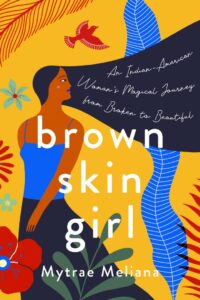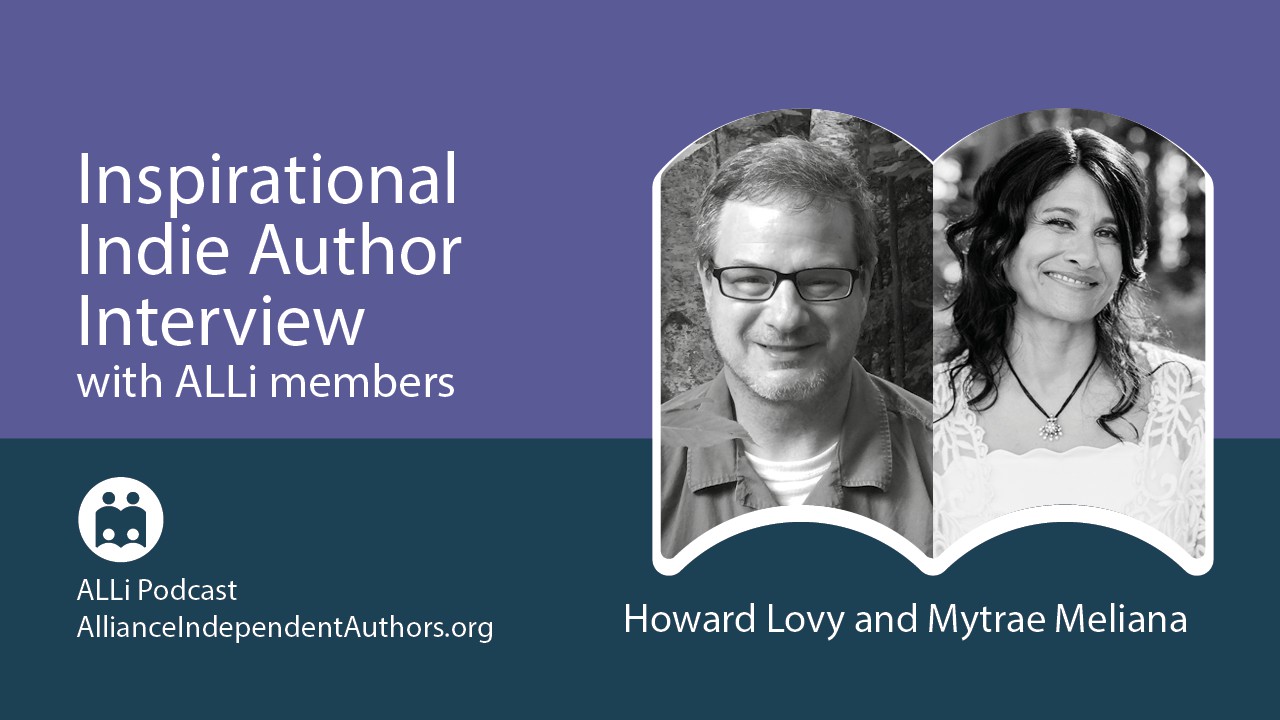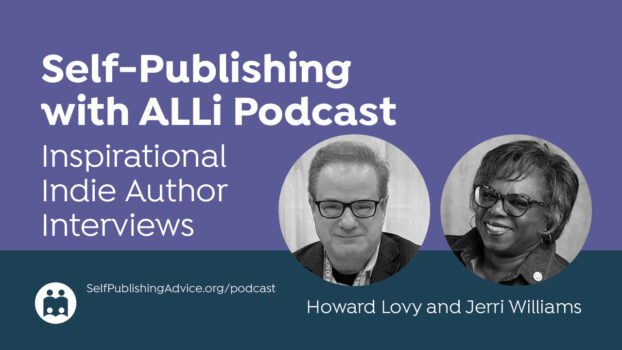My guest this week is Mytrae Meliana, whose story is both painful and beautiful. She came to the United States from India as a teenager, and not only faced prejudice from the outside, but also within her own family, a culture that left few choices for women. After years of emotional and physical abuse, Mytrae at last found peace and a way to use her story to help others. Her book, Brown Skin Girl: An Indian-American Woman's Magical Journey From Broken To Beautiful, is the story of how she got there.
Listen to my Interview with Mytrae Meliana
Subscribe to our Ask ALLi podcast on iTunes, Stitcher, Player.FM, Overcast, Pocket Casts, or Spotify.
On Inspirational Indie Authors, @howard_lovy features @MytraeMeliana. After years of emotional and physical abuse, Mytrae found peace and a way to help others. #indieauthors Share on XFind more author advice, tips and tools at our Self-publishing Author Advice Center: https://selfpublishingadvice.org, with a huge archive of nearly 2,000 blog posts, and a handy search box to find key info on the topic you need.
And, if you haven’t already, we invite you to join our organization and become a self-publishing ally. You can do that at http://allianceindependentauthors.org.
About the Host
Howard Lovy has been a journalist for more than 30 years, and has spent the last eight years amplifying the voices of independent publishers and authors. He works with authors as a book editor to prepare their work to be published. Howard is also a freelance writer specializing in Jewish issues whose work appears regularly in Publishers Weekly, the Jewish Daily Forward, and Longreads. Find Howard at howardlovy.com, LinkedIn and Twitter.
Read the Transcript of my Interview with Mytrae Meliana
Howard Lovy: I'm Howard Lovy, and you're listening to Inspirational Indie Authors.
Every week, I feature a member of the Alliance of Independent Authors to find out what inspires them and how they are an inspiration to other authors.
My guest this week is Mytrae Meliana whose story is both painful and beautiful.
She came to the United States from India as a teenager and not only faced prejudice from the outside, but also within her own family, a culture that left few choices for women.
After years of emotional and physical abuse, Mytrae at last found peace and a way to use her story to help others. Her book, Brown Skin Girl: An Indian-American Woman's Magical Journey from Broken to Beautiful, is the story of how she got there.
Mytrae Meliana: Hi, I'm Mytrae Meliana, I'm a holistic psychotherapist, a women's empowerment and spiritual teacher, a speaker, and the author of Brown Skin Girl.
So, I grew up in India, and I lived there for the first 16 years of my life. That's where I grew up and that's very much home. I grew up in a town called Hyderabad, which is in the South-central part of India.
I had a pretty happy childhood. I was fortunate to be privileged, to have a great education. I had a lot of friends in school and I was very happy girl, and then my family immigrated to the US when I was 16, and that was a huge culture shock because I went right away to college, believe it or not, because the school system is different in India.
I was in a North Carolina town, and I felt like I was literally on a different planet because the culture was so different. So, it took me a couple of years to get acclimatized, to make friends and, you know, really find my ground, so to speak.
Howard Lovy: Unfortunately, finding her ground also meant navigating her way through prejudice in her new country.
Mytrae Meliana: There was prejudice, and I think also it was a lack of understanding. People from there were just not familiar with people coming from other countries and, even in college, you know, it was a Baptist university, so it was more conservative than others, but that's where I went because my parents lived there. They wanted me to stay at home while I went to college. Looking back, there was probably more, but I internalized that. I thought that people didn't like me because I was brown. You know, so it was a hard time, but I did make friends, and then it became wonderful after I made friends and decided what I wanted to major in and really, sort of, found my groove.
Howard Lovy: Mytrae majored in classical piano with the goal of becoming a music teacher. She said she enjoyed the freedom that came with being in the United States and having the ability to choose her own destiny.
Mytrae Meliana: So, after college, I went on to graduate school to pursue a graduate degree in music and piano performance. I was two years into that, you know, then I was able to move away from home and I was hell bent on creating my own life, and not going along with the plan that my parents had for me, which was an arranged marriage down the line.
I fell in love with an American man and kept it secret from my parents, but they did find out. They found out one summer when I was visiting them, and everything blew up. Everything blew up.
There was a family intervention, people came in from different parts of the country, and I was essentially told that I had to go back to India for three months, and if I did, then they would allow me to be with the man.
And I was so confused at the time because I was so torn internally, and I think this is what a lot of people can face, who come from patriarchal cultures, there's this deep schism of choosing oneself versus betraying the culture and family.
I was 22. I was still, you know, not fully emotionally, at least, an adult, even though legally I was. I went back to India for three months, and once I was there, they said I was never returning and essentially placed me under house arrest for a year in my grandparent's home. No phone, there was no internet at the time, no access to mail. It was horrible. It was really one of the darkest times of my life. It was horrible, and there was no access, like here there's access to women's organisations, and this was in the 1980s, and there wasn't that. Even in terms of the police, an unmarried woman really has no rights. I would have just been brought back, and it's dangerous to be in India without money or a passport, both of which were taken from me. So, I was pretty much stripped of my right to freedom and choice.
Howard Lovy: So, Mytrae stayed there for a year while also fighting off attempts by her family to marry her off. Eventually, she learned computer programming and earned enough money to fly back to the United States.
Mytrae Meliana: On route, in New York airport essentially, I wrote a letter to my parents saying, I'm not coming back, and took the little money I had and went off to a small town in Indiana to start over.
So, it was quite an escapade. I had no idea at the time, but I was deeply traumatized. Deeply traumatized and very afraid, lived a very small life.
Howard Lovy: Mytrae sunk into a depression, unable to truly feel music anymore. That's why she went for another graduate degree. This one in computer science, and she married a man she did not love.
Mytrae Meliana: I literally could not feel anything when I played the piano, I was that numb and I was very perplexed by this inability to feel my body, to feel music the way I used to feel it before. So, it was on a soul level, deeply distressing, that I felt like I'd lost the me who I knew myself to be, the spirit of me, you know. But I had to survive, so I went on with the computer science and this friend and I ended up getting married. I wasn't really in love, but I was just surviving. I was just surviving, I wasn't able to really feel and sense what my truth was, and I ended up living that way for 15 years. It's a long time
Howard Lovy: She endured emotional and then physical abuse from her husband, but she had grown up in a culture that places women second and very much frowns upon divorce, even if that means enduring abuse.
Finally, when the abuse turned more physical, she reached out to a South Asian domestic violence agency, where a counselor told her that she was being abused.
Mytrae Meliana: Then I went to a library to read more about emotional abuse, and this is where I guess my love of books and learning helped me because I read, and as I read, I was just amazed to see the symptoms of what I'd been dealing with.
And I had been living with this concept that it was my fault, because that's what my ex-husband led me to believe. So, that was the dawn, I must say, the shift of my changing. And after that, I just proceeded at what I think is probably lightning speed. I questioned everything about my culture. I was able to tap and to return to the beauty and the magic I had remembered as a child and through music, and all these synchronicities started happening; friends from college started writing to me, my piano teacher from college wrote to me, it was a remarkable time as though helping me remember who I truly was after being asleep for many years.
Howard Lovy: Part of her awakening involved going back to school again, this time to become a psychotherapist.
And that is where she really found herself.
Mytrae Meliana: I went right away into private practice and I loved it. I just felt like I knew exactly what I was doing. I was doing exactly what I needed to be doing. And you know, all that I experienced in life really was a profound education to be a good therapist and really get people and empathize and relate and connect with what they were struggling and dealing with, and help them shift from that.
So, I really found my purpose.
Howard Lovy: And she also found her voice as a writer.
Mytrae Meliana: So, it felt like Rip Van Winkle, like I'd slept all these years and suddenly had sort of come to and had lost 15 years of my life. So, I just sat down to write, like I've always journaled. So, I just sat down to write, the first line came, ‘I was a child of the sun' and then it just poured out of me and I couldn't stop writing. And for nine months, I would wake up in the morning, very early four o'clock, sometimes even three o'clock and just write for an hour or two. I just had to get it on the page. I had to get my story out and onto the page. My story needed to be on the page. Then I entered a couple of contests and I won. So, I figured, okay, there's something here.
 Howard Lovy: Her book, Brown Skin Girl: An Indian-American Woman's Magical Journey from Broken to Beautiful, tells her entire story
Howard Lovy: Her book, Brown Skin Girl: An Indian-American Woman's Magical Journey from Broken to Beautiful, tells her entire story
Mytrae Meliana: I won't give away the ending, because it's a journey, and I think we are always surprised by what life gifts us and I think, what I can say is, for me to see the gift of everything that happened to me was what I learned, and that was very beautiful and very healing, deeply healing.
I would not have at all expected that, you know, but I think the journey of healing leads us into places we can't imagine. So, now that my spirituality is open, it's almost like a shamanic experience that people go through.
That's what happens, you know, as and when I work with them. So, it's a profound, deep, healing and transformation and awakening that they get to receive. So, it's wonderful for me, you know, having gone through all the things personally, but now being able to offer that professionally to others.





